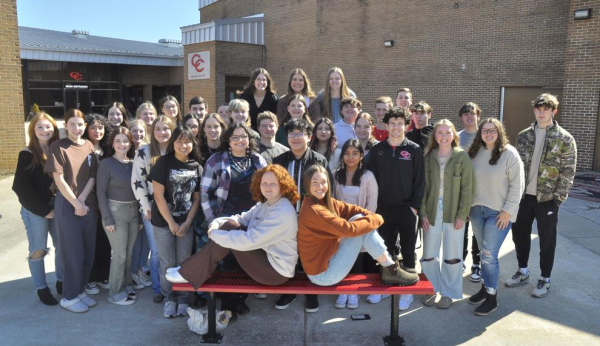Caffeine in Coffee County: A Normalized Addiction
May 22, 2019
Ahh, caffeine. The aroma of freshly brewed coffee accompanies a twirling steam at dawn, makes itself at home as it does so routinely. A pungent freshness is sent from the steeping green tea on the stove. A cash register rings as another five dollar bill is divided into its smaller parts, the same fate of all its lost congruent companions before a familiar ring sounds as a quarter, dime, nickel, and four pennies are tossed into a cupholder. The blessing that is the two for$4.44 deal Monster Energy deal available at nearly every gas station.
Caffeine at its core is a chemical, and a perspective taken outside of the societal norm that its use has become could paint its consumption as a supplement, an over-the-counter remedy, a drug in all forms; yet, in some forms, such as the over-the-counter pain reliever Excedrin, caffeine is consumed as a drug, and any regular consumption can lead to dependency on the chemical.
So how has the habit become so normalized? Simply, the common forms in which caffeine is contained are all pleasant and inviting. Chocolate, coffee, tea, soda, and energy drinks are flavorful and fragrant. Likewise, beneath these enticing disguises are the undeniable benefits of caffeine. The chemical stimulates the nervous system, improves alertness, and helps the user to feel more awake, despite not providing any real source of energy.
That is the full list of benefits, as is common knowledge. Now let’s place them next to the side effects and detriments. Caffeine usage, especially in larger than the recommended amount may “increase heart rate, body temperature, blood flow to the skin & extremities, blood pressure, blood sugar levels, stomach acid secretion and production of urine. People may experience dizziness, hypoglycemia, fruit-like breath odor, troubled breathing, muscle tremors, nausea, diarrhea, increased urine, ketones in urine, drowsiness, thirst, anxiety, confusion, irritability, insomnia, changes in appetite, dry mouth, blurred vision, and cold sweats.” While none of these effects sound particularly pleasant, they are all short-term and do not pose as any long-lasting effects. By the way, there is one misconception: drinking coffee will not sober an inebriated person.
However, overconsumption of caffeine (over 1000 mg in a day) is another case. In fact, these habits may lead to conception issues, increased heartburn, and “changes in bowel habits.” Additionally, sleep deprivation and a habit to disregard signals that one may need rest can lead to mood depression. The substance is also classified as addictive by the World Health Organization.
So back to the question. “How has this addictive habit become such a social norm?” Well, the routine usage practiced by over half of all American adults is also practiced by a stunning 73 percent of children, and 31 percent consume the substance in the form of energy drinks, a habit most of these children carry into adulthood. The root of the problem forms young. In fact, nearly 15 percent of toddlers up to the age of two consume up to a half cup of coffee daily.
With these habits forming at such a young age, it’s apparent why so many teens are relying on caffeine to make up for lower energy levels perpetuated by lack of sleep and time available for students. What’s worse is that the effects of caffeine on children are much more severe than developed adults. In a 2014 study on the effects of caffeine on adolescents, the substance increased their blood pressure yet decreased their heart rate. With higher concentrations of caffeine consumption, their heart rate increased.
Additionally, “jitteriness, nervousness, upset stomach and problems sleeping and concentrating” may occur with the consumption of the chemical,” but these effects are trivial in comparison to the unspoken rates of death related to overconsumption of caffeine. Nearly 13 deaths a year are related to 5-Hour Energy, and an unknown rate related to Monster Energy. The highest death rate related to caffeine consumption comes from consumption of the easily consumed caffeine pills sold in every gas station in every city. In fact, a 24-year-old Cara Reynolds overdosed on high-caffeine raspberry ketone pills, an amount which left the equivalent of 225 cans of Red Bull in her blood at the time of her death.
With these side effects, the normalization of caffeine dependence in the U.S. is alarming. Again, nearly 73 percent of children consume caffeine routinely. So just what is pressuring our youth into this unhealthy habit?
Well, simple math says they simply don’t have enough time to indulge their interests. With roughly nine hours a day invested into school, excluding time spent on homework, and a conservative estimate of eight hours spent sleeping (despite teens needing up to ten hours a night for proper development), only seven hours a day remains free for students to explore their interests.
The fact is our children should be given more time to indulge their passions and work towards their personal goals. In the current state of our education system, a majority of the time of our youth’s development is spent worrying about school and homework instead of the people they are and will grow to be. Thus, we can’t be surprised when they stay up later despite being forced to wake up every day at the same early time between 6 and 7 a.m., and when their energy levels decrease, they supplement this with caffeine usage, which fosters even unhealthier sleep habits. It is a vicious cycle. Perhaps this is why the average amount of sleep teenagers get is between seven and seven and a half hours a night despite needing nine to nine and a half hours a night. Perhaps this is why nearly twenty percent of adolescents experience depression before adulthood.
There are healthy ways to increase energy levels- the most obvious being getting proper sleep and exercise; however, with rates of demotivation and depression in adolescence being higher than ever before, especially coupled with the lack of time on their hands, it cannot be reasonably expected for them to practice these habits.
The problem is obvious. School takes far too much time away from the American youth. Without the proper time to indulge in their passions and interests, the age-old problem regarding difficulty in self discovery only worsens, and interestingly enough, with the effects of depression on motivation, devoting more time to school may actually decrease the benefits offered through education. The education system fosters chemical dependencies and poor sleeping habits. It is no wonder why our youth seem be more pessimistic than ever before.














